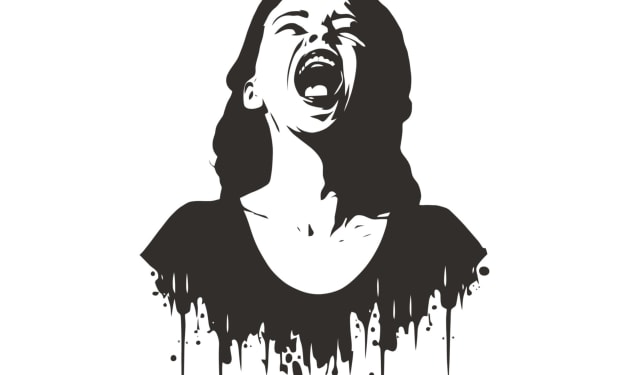The Hysteria of Men
An informal history of hysteria

Once upon a time, hysteria was a term used to describe an affliction of the womb and a woman’s ovaries. Medical practitioners, such as the well-known Hippocrates, used the term hysteria to describe a tilted womb, ovarian torsions, uterine fibroids and other painful afflictions that are common to women. Hysteria was a very real medical condition that could be fatal to women and sometimes could only be repaired by removing the reproductive organs of a woman. This practice is called a hysterectomy, because it refers to the illness of hysteria that required this type of surgical treatment.
Fast forward to current times, today, hysteria is referred to as a symptom of a mental health condition that a woman might suffer from. Oh Lordy, Lordy. Now how did that happen? Possibly, because Hysteria is a term that men are accustomed to hearing when only in reference to a woman’s health. Over the course of time, it was distorted by male practitioners who did not understand the physiology and biology of a women’s anatomy, most likely due to a period in history when religious restraints kept doctors from examining and studying the inner workings of the human body.
Hysteria plays an interesting role in history, in which it once saw a time when men took woman’s painful and often deadly childbearing burdens very seriously and doctors believed that a woman’s overall health depended upon the health of her reproductive organs. Yet, centuries later, hysteria took a morbid twist into an eccentric world where the doctor's role was to help a woman find relief from sexual desire. The cure for hysteria became a vaginal, or anal massage, otherwise known as masturbation. It became so widely spread as a remedy for most women’s reproductive problems, that the vibrator was invented to help the doctor from becoming overly exhausted while assisting all of these women with their medical needs.
The wonderful psychologist, Freud, remedied the medical industry’s female hysterical problem, by changing its terminology, and renamed it the Oedipus Complex. If you are not familiar with Oedipus, you should read the Greek myth that Freud made famous. According to Freud, every incident of hysteria leads back to your sexual desire for your own mother. It’s rather a blunt description, but it sums it up quick. Again, hysteria becomes a man’s term for a woman’s problem, and the further on we march, the more obvious it becomes, that men started to believe that hysteria was the fault of a woman’s sex. Remember that; Hysteria morphs and the problem becomes all about a woman’s sex, not about the injury caused to a woman’s reproductive organs often due to a male’s member.
In the 1980’s, Hysteria makes another transformation, and it is removed from the list of mental health diagnoses, mostly due to Freud losing popularity in the field of psychology. Hysteria, today, is considered to be a symptom of a mental health disorder, mostly regarding the health of women. To add further insult to the psyche of all women, most of the pain that women suffer, from the original ailments that hysteria once referred to, are not even acknowledged. Painful hysteria symptoms are ignored, even by women doctors who work in the field of OB-GYN, because the medical industry, ruled by men, refuses to accept that a woman’s reproductive organs play a huge part in the overall health of any woman, and the same for men.
The conclusion is, that the hysteria of men played an enormous role in the twists and turns of the medical industry’s belief in what hysteria means and the ignorance of what women need in the terms of reproductive health care. I, myself, take this personally. For twenty years I suffered from an ovarian torsion that ruptured my ovary. My pain was not taken seriously or looked at as life threatening. Because of the ignorance of many male and female doctors in the OB-GYN industry and other medical fields, I suffered permanent damage to my central nervous system and cardiovascular system and was left without a professional diagnosis to assist me with rehabilitative services. There is not enough study of the female reproductive system and its impact on a woman’s physical and mental health, leaving many women to live lives with the stigma of a mental health disease called hysteria, otherwise referred to as panic attacks. When, in fact, hysteria is a man’s terminology for something that he made up because he is incapable of experiencing or understanding how a woman’s reproductive organs work.
Just a thought added as a note: When I went into labor with my first child, my body automatically began the process of labor, in which the muscles in my abdomen and uterus began to gently push the baby out in the form of contractions. The male doctor kept telling me to push, when my body was relaxing after each contraction. I told him that I would be better off pushing in the manner that my body was working. The doctor became aggravated and told me that the human body did not work in that manner. He insisted that I did as he said. It was my first child, and it was my first experience giving birth. This is a perfect example as to how all doctors invent, and then push on their patients, their idea about something they have never experienced. Consider that thought the next time you visit a doctor for a condition that your doctor has never experienced.
About the Creator
Chelas Montanye
I’m an advocate for education and equal health care. I love satire. I love to express myself through art and writing. Social issues fascinate and astound me. Co-founder of Art of Recycle.
Enjoyed the story? Support the Creator.
Subscribe for free to receive all their stories in your feed. You could also pledge your support or give them a one-off tip, letting them know you appreciate their work.
Reader insights
Nice work
Very well written. Keep up the good work!
Top insights
Eye opening
Niche topic & fresh perspectives
Easy to read and follow
Well-structured & engaging content
Excellent storytelling
Original narrative & well developed characters
Compelling and original writing
Creative use of language & vocab
Masterful proofreading
Zero grammar & spelling mistakes
On-point and relevant
Writing reflected the title & theme
Expert insights and opinions
Arguments were carefully researched and presented







Comments (8)
well-written
Thank you for teaching us about this. Wonderful article
Oooh, nice take home message at the end there, kind of ground breaking, and such a good point about trusting your own body over somebody else's outside perspective.
Amazing!
Excellent TS, and a good twist on the use of language that can define what is rarely understood!
Excellent Article and also Congratulations on your Top Story❤️💯🎉
Excellent information!!! ❤️❤️💕
Good article you've written. Thank you for sharing.